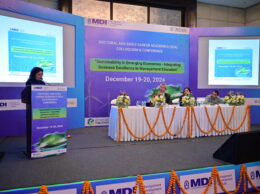BENGALURU : NSRCEL, the startup incubator at IIM Bangalore, and the Centre for Research on Start-ups and Risk Financing (CREST) IIT Madras, today announced the release of their joint research report, ‘India Incubator Kaleidoscope 2024’.
The joint effort was led by Prof. Thillai Rajan A., Head, CREST and Professor of Finance, Department of Management Studies, IIT Madras and Prof. Srivardhini K Jha, Professor of Entrepreneurship, IIM Bangalore and Chairperson of NSRCEL. It offers valuable insights and recommendations to policymakers and business leaders on how to create and nurture thriving startup incubators, which are essential for job creation and economic growth.
Speaking about this study, Prof. Srivardhini Jha said, “Incubators play a crucial role in making entrepreneurship more accessible and inclusive across the country but their activities and impact are not well understood. This report addresses that gap and highlights the need to both raise the level of incubation activity and enhance the quality of incubation efforts nationwide.”
The Highlights of this research include:
Incubator landscape
Ø The number of incubators in the Indian ecosystem has grown steadily, with more than 1,100 active incubators dotting the Indian startup ecosystem. The Southern region leads the pack, housing 45% of all incubators and having the highest density of incubators.
Ø Tier I cities house almost half of all incubators (48 percent). However, the mix of incubators, viz., those hosted by academic institutions, industry and public sector, shows significant variation across cities. Chennai has a high proportion of academic incubators (82 percent), whereas Bengaluru and Gurugram have a high proportion of industry incubators at 71 percent and 84 percent respectively.
Ø The incubator density is 0.8 incubators per million population, whereas countries like US, UK and China range between 8 and 10 incubators per million population. This indicates the need for setting up more incubators in the country
Incubator coverage
Ø Only 8.2 percent of all startups undergo incubation. Further, 10 percent of the incubators support 98 percent of these startups that are incubated. Taken together, this highlights an urgent need to improve the performance of incubators that are underutilized and to actively engage in outreach efforts to raise awareness about the benefits of incubation.
Ø The correlation coefficient between the presence of incubators and startups was found be 0.84, which indicates a strong positive correlation. A higher presence of startups is associated with a higher presence of incubators.
Ø Incubation is sought after by students, young professionals, women founders and those with modest financial resources. This is a positive trend that indicates that the support system is working for those who need it.
Ø The rate of incubation is high among deep tech sectors such as AI/ML, Data Analytics, Biotech and other sectors. All of them have an incubation rate upward of 12 percent.
Incubator outcomes
- Incubated startups have been able to secure their first round of funding earlier than the non-incubated. While 27.1 percent of the incubated startups that received their first-round funding within one year of incorporation, the corresponding percentage for the non-incubated was 15.4 percent
- Despite being smaller in number, incubated startups have won more awards in all the leading startup awards. Incubated startups have also been engaged more actively in creation of intellectual property – the percentage of incubated startups that have published patents is about 5 times more that of the non-incubated
- For the startups that ceased to operate, the average age at which operations ceased was about 15 percent higher for incubated startups, indicating that incubators could provide a nurturing ecosystem that provides more time for the ideas to flourish
- The contribution of the incubated startups to the economy has also been significant. The annual average revenues in the initial years for every 100 incubated startups has been about ₹1590 crores. The average value of assets for every 100 incubated startups by the 9th year from incorporation has been estimated at ₹10627 crore. However, the revenue performance of startups associated with industry incubators is 50 percent higher as compared to those supported by academic incubators
Elaborating further, Prof. Thillai Rajan A., IIT Madras, said, “The narrative on the Indian startup ecosystem has centered around start-ups and investors. This report turns the spotlight on incubators, a significant link in the startup value creation chain. ‘Tell me who your friends are, and I will tell you who you are’ is a well-known proverb. In much the same way, our research finds that incubators enhance the credibility of the startups that they support. This manifests more compellingly in startup funding. Incubated startups are two and a half times more likely to get funded as compared to the non-incubated.”
Launching the publication, Shri Amitabh Kant, G20 Sherpa, Government of India and ex-CEO, NITI Aayog said, “In the growth of Indian startup ecosystem, incubators play a very crucial role, and their contribution has been expanding in recent years. Conceptualized initially to facilitate the formation of start-ups, today incubators perform multiple roles such as bringing together scientific and business expertise, channelizing capital to promising start-ups, and increase awareness on startups in the society. For the government, incubators are becoming the last link in identifying startup beneficiaries for various schemes and monitoring their progress. I am happy to note that two of the best institutions in the country have joined hands in bringing this timely as well as relevant publication on incubators. Their findings vindicate the policy emphasis on incubators, while giving suggestions on how the incubation landscape can be further enriched through various interventions.”
Prof. Rishikesha T. Krishnan, Director, IIM Bangalore, said, “The value of innovation cannot be overstated. Incubators play an important role in supporting the unique needs of diverse creators not only by accelerating grassroots development but also by leveling the playing field.”
Among the various significant findings of this collaborative research undertaking is one—that cities of Chennai and Bangalore lead the startup ecosystem with their high concentration of industry and academic incubators. As IIMB stands at the heart of India’s knowledge capital, we look forward to continuing our sustained contribution to the city’s deep roots—its history and investment in the future of growth and innovation”.
Prof. V. Kamakoti, Director, IIT Madras, said, “For Bharat to become a superpower, we must aspire to make our country as a Startup Nation. This effort involves interactions between multiple stakeholders. This report addresses this crucial point and the challenges. I am sure the recommendation of this report will be immensely beneficial for all the stakeholders.”
The report was launched in the presence of Amitabh Kant – G20 Sherpa, Govt. of India, Rishikesha T Krishnan – Director, IIM Bangalore, Anand Sri Ganesh – CEO, NSRCEL among others as part of SummitUp the flagship event of NSRCEL, IIM Bangalore.









